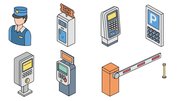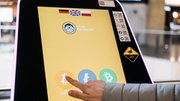Blog
Are kiosks still relevant in a mobile world?
February 20, 2012 by Michael Ionescu — President, Ionescu Technologies
When I tell people that one of the specialties of my company is building and developing customized interactive kiosks for tourists, many people ask how kiosk companies are still viable with the rapid growth of smart phones. Because a smartphone can do many things a kiosk can but doubles as one's own personal device, the basic assumption is that a smartphone would make kiosks obsolete. Common sense would tell us that this would be the case, but then why is the kiosk industry growing and still thriving today?
The answer is that while mobile phones have the capability to mimic the functionality of kiosks, consumers just don't use smartphones in that way.
Let me throw out a few boring stats to illustrate. It was estimated that by the end of 2011, approximately one in two people will have smart phones. With the millions and millions of people owning and buying smart phones, why would kiosks not be going the way of the dinosaur? A study showed that 80 percent of the time spent on smartphones are spent either on gaming or social networking.
What about the remainder? Looking up maps and using the GPS for directions? That stat doesn't even warrant a category. Looking up local restaurants and shopping destinations? Nope? The remaining 20 percent is split between news, entertainment, and "other." Some of the best features of a smart phone are completely underutilized. Phones can be used to access online coupons, look up local destinations, get an airline border pass, make reservations, use an NFC capability to act as a credit card, etc. Yet, none of those things even register on a breakdown of smartphone usage.
So the question becomes will smart phones ever completely make the kiosk obsolete if it has the potential? Well the answer is maybe, but past consumer behavior seems to indicate that this probably won't happen. For years smartphones have had the ability to act as a GPS receiver and provide real time mapping capability, yet only a small percentage of smartphone owners use it. Many consumers still use dedicated GPS devices for their cars rather than their phones, and people are still buying new GPS devices. While the dedicated GPS industry has slowed, it is in no way gone.
Rather than think about the number of ways that the smartphone could make a kiosk obsolete, I'd rather think of ways in which kiosks and smartphones can co-exist. Interaction between smart phones and kiosks could be one particular answer to this question. Comments are welcome below to discuss where you think kiosks will be in five or 10 years or ways in which kiosks could be integrate with smart phones.
 ChatGPT
ChatGPT Grok
Grok Perplexity
Perplexity Claude
Claude









